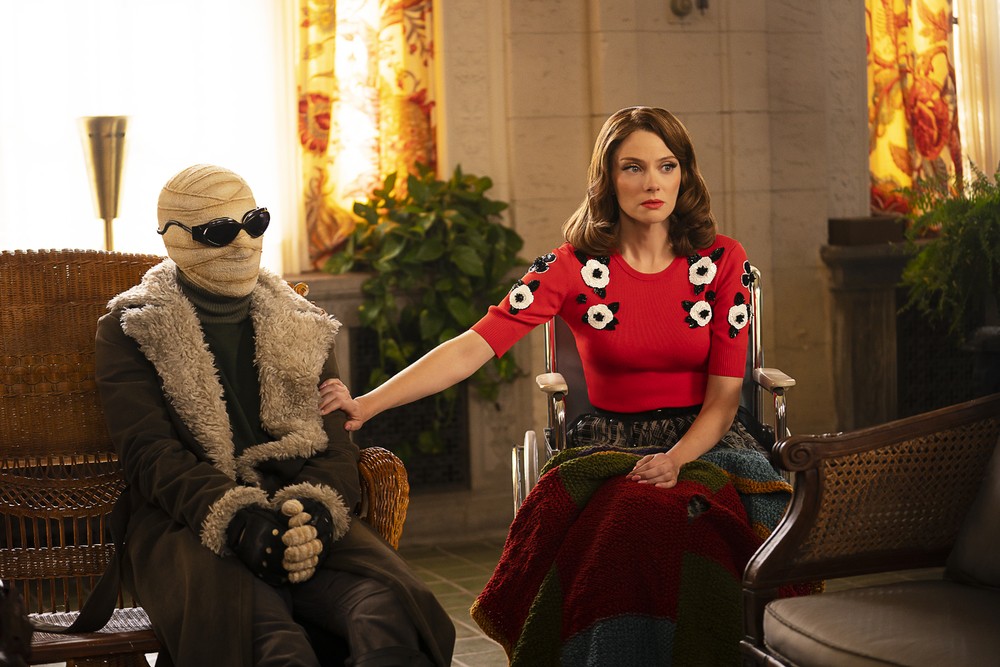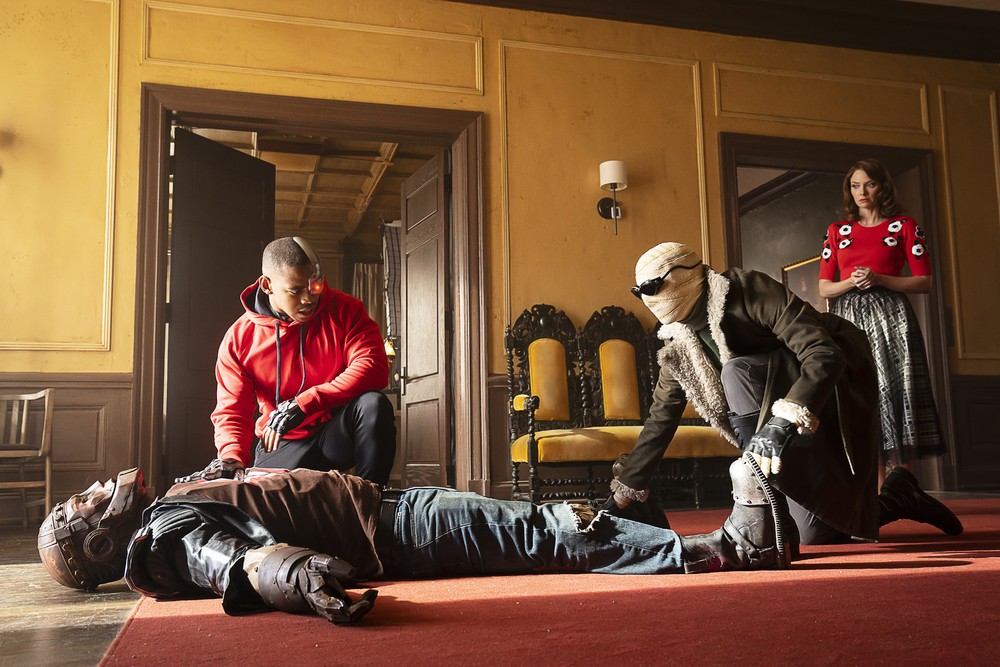[Editor’s Note: This review may contain spoilers]
Director: Rob Hardy
Writer: Neil Reynolds
Starring: Brendan Fraser, Matt Bomer, April Bowlby, Diane Guerrero, Joivan Wade, Mark Sheppard, Timothy Dalton, Alan Tudyk, Riley Shanahan, Matthew Zuk, Phil Morris, Kyle Clements, Charmin Lee, Bethany Anne Lind, Alan Heckner
Summary
Cliff has a violent outburst leading to a group therapy session from the Doom Patrol. Stay tuned as each member shares, grows, and pours their heart out.
Positives
This episode is one of the most important single episodes out there for TV, mental health in the media, and many other classifications because its core premise is one that many properties out their are afraid of: sitting around and talking. Everyone does a spectacular job in this episode, but Rob Hardy and Neil Reynolds in particular. They are both names that your everyday fan may not know, but they have contributed to many great episodes of television over the years, and this may be their most important yet.
Its finally fitting to talk about the opening sequence of the show. Its a series of images, very much in the vein of Westworld, set to instrumental techno music. Westworld‘s credits struck a chord because it was soft, instrumental, and non-sequential, yet its message was loud and clear. It spoke of immortality beyond the physical form, and used the beautiful classical music, the soft-textured images, and the frequent theme of creating life to underlay that. Doom Patrol is similar but intelligently speaks to the opposite. No matter how preserved or permanent something may be, there will always be damages and flaws. The images create something new out of older objects, and they display the creation of things that are broken. The sequence is vulnerable, conscientious and grotesque, because everything shown is beautiful while still being damaged.

The opening scene takes place in Doom manor. It is empty, quiet, dusty, and has a very old feel to it. Robotman begins with a speech about how they need to talk things out. Its not a suggestion or a thought but a demand. Robotman says it bluntly and lacking feeling, despite the fact that the overall goal is to share feelings. That’s where we open, but what follows are a mix of flashbacks and scenes of life through the eyes of each team member’s perspective that shows incredible balance amongst five considerably unique and complex characters. Each flashback is extremely important to that respective character, and the visuals and sound go a long way towards showing that by capturing the mood and style of the scene with the era the scene is set in. It truly brings everything to life.
We begin with Rita whose entire theme is composition. The very first thing we find out is that Rita Farr is not her actual name. We don’t know what that name is, and it begs the question: does she? Was she ever given the choice of who she wanted to be? When we return from this memory and she is struggling to literally compose herself into her human form, it is so powerfully shot underneath Rita’s bedsheets. It shows the person she is trying to become and her struggle with composing herself while not showing the viewer the actual visuals of the transformation. The scene is not about the visuals or Rita’s ugliness, but it does acknowledge that its there because its always a part of her. The scene is about Rita discovering her complete self. Rita has been the most consciously trying to grow amongst the Doom Patrol members, but no one seeing that is causing her to struggle. Rita always uses the phrase, “The person who is breathing is me,” in order to compose herself. That means that in her mind, the altered or more grotesque forms she can take on are not her, but they are. Its a statement in order to compose and control, but to truly get a grasp of herself Rita had to understand that the melting and the slime are a part of her identity. When she finally accepts that, she is able to compose herself. She did it! Did anyone see it? Did it even happen? Cue falling apart. Who she was is a part of who she is and will be, and Rita, or whatever name she chooses, will have to see that to move forward.
Moving on with Larry, his primary struggle is coming to terms with who he is and owning it, particularly with regards to his homosexuality. We see him for more of the episode without the bandages than with the bandages, and that is extremely special because of its vulnerability. Rita and Larry’s visuals in this episode are the best they’ve ever been, especially Larry’s skin, and they use them so intelligently. Instead of using the visual effects to shock or repulse, the show uses Rita and Larry to show how easy it is to accept and listen despite flaws. It promotes healing, and its clear that at least some part of Larry wants to get there, but his deep-seeded revulsion of himself since he was a child is getting in the way. He is trying to communicate with the spirit and doesn’t how, but the answer is one of the most powerful tools humans have: memory. Communicating through memories, fantasies, and falsehoods allows Larry to finally let loose about the pressure he always felt from others and the pressure he felt from himself. He can let it out and admit it to himself because there is no pressure in a memory. Now Larry just needs to figure out where to go from there.
Continuing with Vic, “Therapy Patrol” gives some of the best Cyborg character moments ever across any medium. Cyborg is more than just angry at his father, he is also scared of his father and has been since he was a child. Ever since the accident, Cyborg has let Silas control his life because Cyborg is scared of defiance, but he’s finally trying to move past all of that, specifically with social media. Unfortunately, all of the superficial judgments he despises are reflected back on him through his dating profile, so he turns to the only thing he can control: his routine.

Jane’s problems, on the otherhand, are largely ignored because people assume she always having problems, and that there are 63 other personalities to turn to that aren’t having the same issue. The idea that the Chief was planning on abandoning Jane in the home of the old Doom Patrol, however, is felt throughout all 64 of Jane’s personalities. She doesn’t know what to do or feel, so she feels it all. She has personalities going through all five stages of grief and reacting to this abandonment in countless different ways, and no one pays enough attention to help anyone except the Jane personality with that.
It is Cliff, however, who feels the most real. He often says what the audience is thinking in a very crass and unafraid way. He feels irrationally angry and lashes out like his father did when he was a child. Cliff has become exactly the thing he was afraid of, and he continues living in fantasies because he doesn’t want to come to terms with that confrontation. Most of Cliff may be metal, but his brain is still real, which means he can have the same mental health troubles as any of us. Luckily, its Cliff who realizes that talking is important, so the Doom Patrol comes together for one group therapy session.
Unfortunately, Cliff is also the worst person to be during this session because he pushes people to share more than they’re comfortable sharing, he interrupts people, he steals their moments, and he pushes growth too aggressively. Cliff effectively ruins Larry’s moment by pushing too hard, and only Rita and Vic are able to have meaningful breakthroughs. Victor Stone’s breakthrough in particular is one of the single most important pieces of Cyborg characterization across any medium. He is dealing with human vs. machine, which we are all used to, but also logic vs. emotions, trust vs. instinct, and confidence and trust in himself and in his family all at the same time. The scene is extremely raw, and Cyborg doesn’t receive many of those. The show is wrapped up in a nice little package through Mr. Nobody, Admiral Whiskers, and a great Princess Bride reference and ends as one of the most important single episodes of television we’ve seen in a long time. Especially of the superhero variety.
Negatives
There are no negatives for this episode. “Therapy Patrol” accomplishes everything it says out to do at a level above and beyond any expectations people had for this show. If anything, the episode could have been a little longer just because of how good it was.
Verdict
Doom Patrol episode 8 excels at depicting different mental health concerns across five very complex characters in a single episode, and cements itself as one of the most important episodes of television we’ve seen in a long time.

